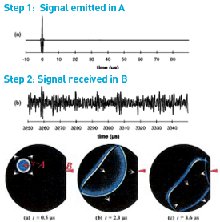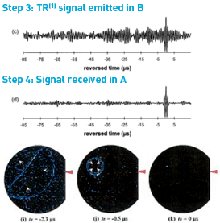Mot invests in acoustic touch technology
Dec 4, 2009 — by Eric Brown — from the LinuxDevices Archive — 7 viewsMotorola venture capital arm Motorola Ventures has made an investment in multi-touch technology firm Sensitive Object. The French touchscreen technology company has developed patent-protected technology that uses acoustics to analyze sound waves caused by touching any surface of a device.
Sensitive Object's technology can be deployed in any touch-based product, including mobile devices, says the company. The patent-protected Anywhere MultiTouch platform and ReverSys software is capable of "tactilizing" any surface, including glass, aluminum, and plastics, the company says.
According to Sensitive Object, its "natural user interface" (NUI) technology uses acoustics to "analyze sound waves departing from the point of a touch to precisely and cost-effectively transform any product into a touch device." Claimed to be competitive with existing touch technologies in both cost and performance, the technology extends tactilization to any surface of a device, enabling multi-touch, handwriting recognition, and palm rejection, the company adds.
How it works
The ReverSys software that drives the system is based on a process known as Time Reversal Mirror, according to Sensitive Object. This process can be used to identify the source of sound waves precisely using proprietary signal processing algorithms combined with software (see diagram below). A glass panel equipped with two piezoelectric sensors is used to detect sound waves and to determine the acoustic signature.


ReverSys is based on a process called Time Reversal Mirror, in which the acoustic signature from touch activity is correlated against a previously recorded training step.
Source: Sensitive Object(Click on either image to enlarge)
From gaming systems to mobile phones
When Sensitive Object introduced Anywhere MultiTouch in April, it noted initial applications in home automation, interactive point of sale, information desks, and gaming. The company also said it was extending this technology to mobile phones, netbooks, laptops, PCs, and portable games terminals.
For mobile phones, Sensitive Object suggested, the ability to make use of non-display surfaces for touch interactivity could have numerous benefits. For example, the company mentioned the possibility of scrolling a web page simply by stroking the side of a device, plus a game application that uses the top, bottom, and rear of the handset as touch sensitive inputs. Other possibilities that come to mind include volume controls, or various commands enabled by tap sequences on the back of the phone.
Sensitive Object was founded in October 2003 as a spin-off from the French Science National Research Centre (CNRS), and received funding from venture capital firm Sofinnova Partners in August 2004. The company has a workforce of more than 20 engineers and has operations in Paris and Singapore.
Availability
Motorola did not reveal the extent of its investment, nor did it reveal when Anywhere MultiTouch might be ready for integration on touch devices such as the Android-based Droid by Motorola. However, considering that Multec (Flextronics) licensed the technology in July, it could arrive on Mot devices fairly soon.
More information on Sensitive Object may be found at the company website, here. An eWEEK story on Motorola's investment may be found here.
This article was originally published on LinuxDevices.com and has been donated to the open source community by QuinStreet Inc. Please visit LinuxToday.com for up-to-date news and articles about Linux and open source.